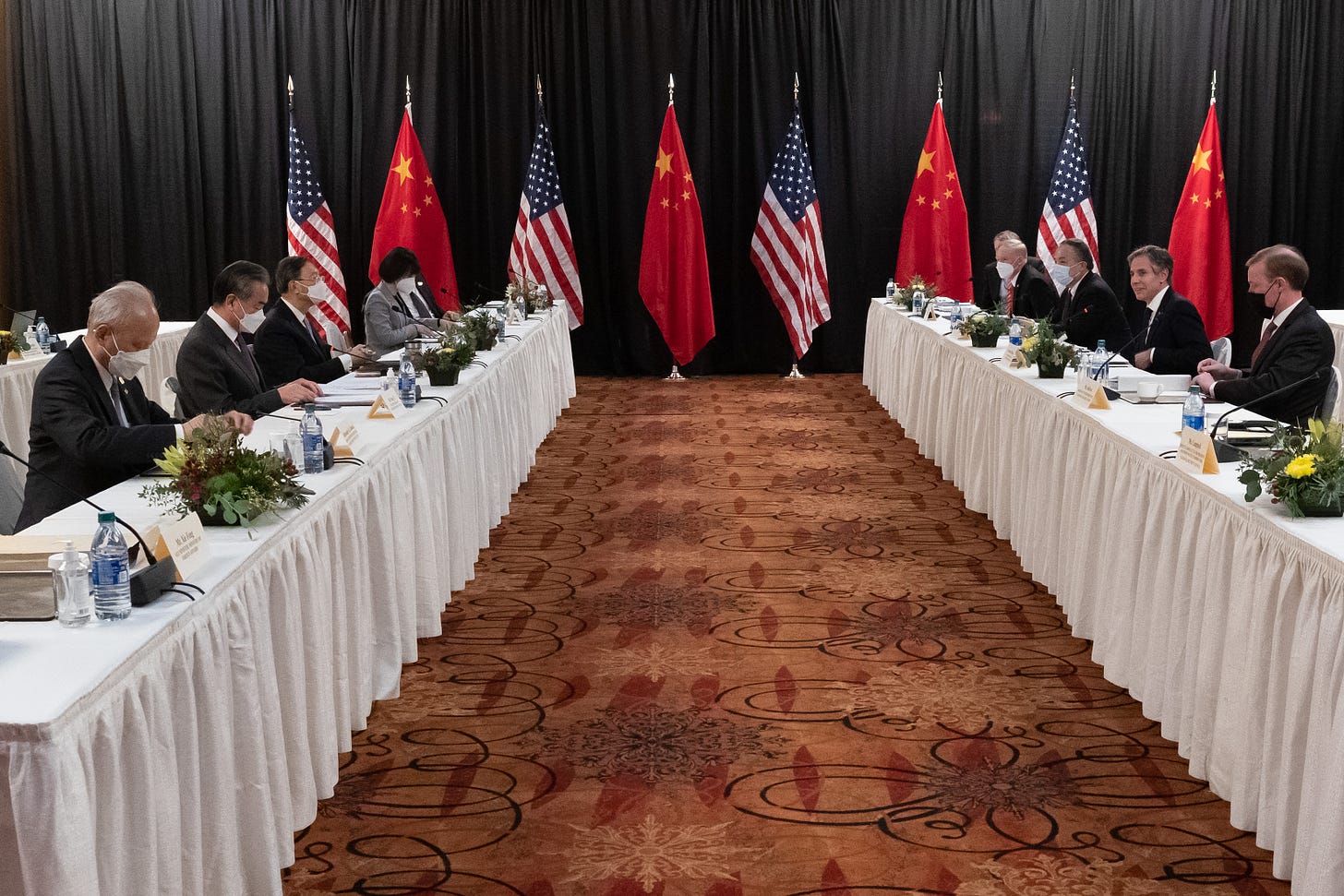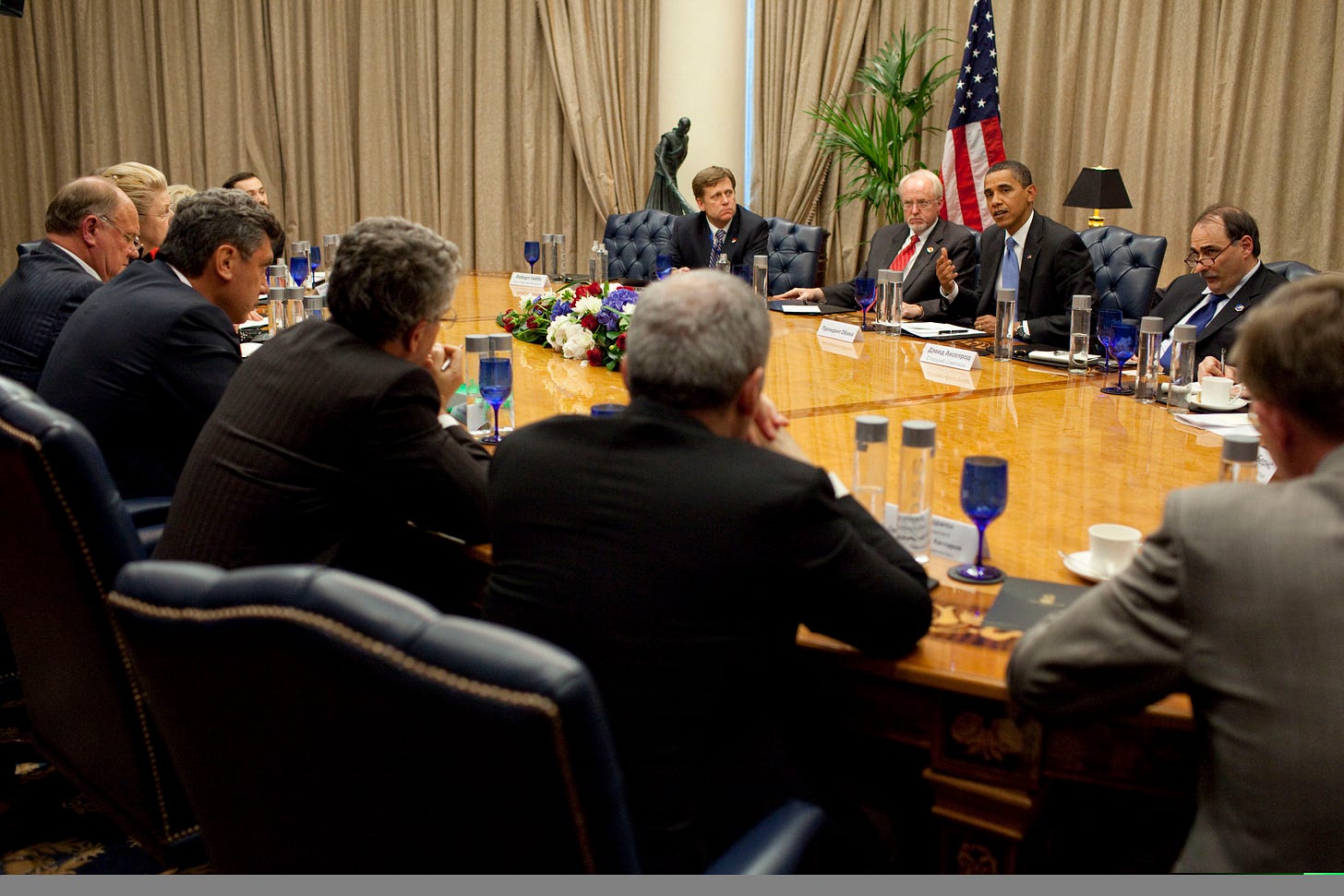“Improved Relations” with China (or any other country) Should Never Be the Goal of Diplomacy
But we must keep talking - Blinken is right to reverse this dangerous trajectory of diplomatic disengagement.
When I worked in the U.S. government during the Obama administration, first as the Special Assistant to the President at the National Security Council (2009-2012) and then as the U.S. Ambassador to Russia (2012-2014), it used to drive me nuts when colleagues said that we needed to “improve relations” with Russia. I categorically disagreed.
“Improved relations”, “thaws”, or “détentes”, should never be the goal of diplomacy towards adversaries – or even allies. Rather, “improved relations” should be understood as a means – one of many – to achieve concrete outcomes that advance the security and economic interests of the American people. I would also add the advancement of values – democratic, American, universal – to this list of objectives, even though some might disagree. But getting the goals versus the means right was and remains critical.

For instance, in the first years of the Obama administration, some thought “Reset” with Russia was a policy to improve relations. I did not. I was not interested in holding hands with the Russians and singing kumbaya. Neither was President Obama.
I was interested in negotiating the New START Treaty – an agreement that dramatically reduced the number of deployed nuclear weapons in the world and gave us an opportunity to learn about Russian nuclear weapons through regular inspections.
I was interested in denying Iran nuclear weapons – a goal that required us to work with the Kremlin to secure United Nations Security Council Resolution 1929 in 2010, thereby imposing the most comprehensive set of multilateral sanctions against Iran ever.
I was interested in expanding the Northern Distribution Network (NDN) – a route to transport our soldiers and supplies into Afghanistan through Russia, Central Asia, and the Caucuses, thus reducing dependence on our supply route through Pakistan. That shift in supply routes was critical to the U.S. mission to kill Osama bin Laden in Pakistan in 2011.
In all these cases, the goals were concrete U.S. security objectives: reducing nuclear weapons, stopping Iran from obtaining nuclear weapons, and killing Osama bin Laden. The means to achieve them was diplomacy. (For the details, see my book From Cold War to Hot Peace: An American Ambassador in Putin’s Russia.)
Other policy objectives require different means, like sanctions, deterrence, or indifference. And today, obviously, the most important U.S. objective regarding Russia – stopping Putin’s barbaric invasion of Ukraine – requires military assistance to Ukraine, even more sanctions, and international isolation of Russia. Different goals, of which “improved relations” in itself should not be one, require different means – and diplomacy is only one of many means necessary today.
My second pet peeve about conventional diplomacy was the practice of linkage. Sometimes it’s necessary; most times it should be avoided. In particular, I objected to the idea of being silent on some human rights or democracy issue as a way to get President Medvedev or President Putin to do something else for us in return.
It never worked. Putin and Medvedev only did things when they served their personal or national interests. Moreover, leaders, even between allies, rarely do personal favors; they do what is in their interests as defined by them.
A third pet peeve was framing a diplomatic meeting as a ‘reward’ or a ‘gift’ to Russia. Presidential summits are a different matter. When Putin gave Edward Snowden asylum, we rightly canceled a planned Obama-Putin summit in Moscow in 2013. But meetings between diplomats should be understood not as a gift, but as a means for obtaining knowledge about a country and conveying information about our interests and intentions. (On this important lesson about diplomacy, read George Shultz’s memoir, Turmoil and Triumph: Diplomacy, Power, and the Victory of the American Deal.)
These lessons from my time in government are on my mind as Secretary of State Antony Blinken heads to Beijing this weekend for his first and long-overdue trip.
First, Blinken’s goal for this trip should not be “improved relations” or a “thaw” with the People’s Republic of China. Instead, he should seek to advance very concrete U.S. national interests. The U.S. and China achieving concrete outcomes together will improve the mood music in their bilateral relations, not the other way around. On this trip, Blinken will most likely come home with few concrete outcomes – the State Department calls them “deliverables.” That’s ok.
Second, Blinken should avoid linkage. Above all else, he should not think that refraining from talking about human rights abuses will produce progress on other matters. Blinken should, in fact, practice “dual-track diplomacy”. He should talk with Chinese government officials on all issues of importance and meet separately with Chinese non-governmental actors – civil society leaders (although they are fewer and fewer in numbers these days), students, businesspeople, academics, et cetera.
Third, Blinken should use this visit and hopefully many others to come to better understand the intentions and interests of the Chinese government. The more contact, the better. As I used to say while working in Moscow, we have fundamental disagreements with our Russian counterparts that will never be resolved through more meetings or dialogue, but we must never allow disagreements to develop based on bad information or misperceptions.
In recent years, there has been too little dialogue between senior Chinese and U.S. officials. A lack of face-to-face contact creates permissive conditions for misunderstandings and misperceptions. Blinken is right to reverse this dangerous trajectory of diplomatic disengagement. His trip should be the first of many to Beijing by senior U.S. government officials.
Diplomacy is not a gift. Nor is it a goal. Diplomacy is a means to advance U.S. interests – including sometimes, most minimally, just intelligence gathering. Given how contentious U.S.-China relations have become, just knowing better the intentions and purposes of the Chinese government might be the most realistic goal of Blinken’s diplomacy next week.



Excellent article!!
I agree. Very often improving the tenor of the relationship between states does further a nation's concrete aims but that is a means to an end and not an end in itself. This particular confusion of means and ends is very common.